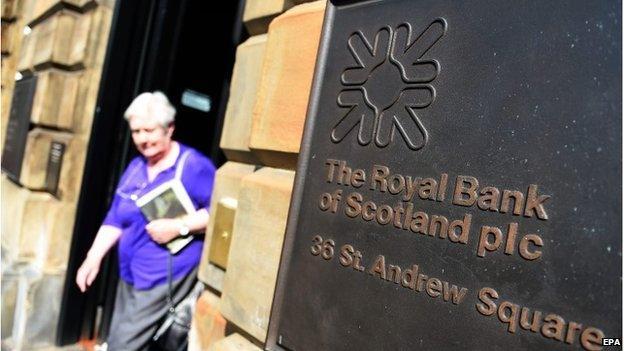Does the Anglicisation of banks matter?
- Published
- comments

You might be interested in why so many banks - Lloyds, RBS, Clydesdale, TSB and Tesco Bank - have all said in the past 24 hours that in the event of Scotland voting for independence they would move their legal homes south of the border or create new English companies for some of their operations.
Why have they moved in a sheep-like way in collectively making these disclosures?
Well they all had to consider making this announcement last weekend when opinion polls showed the possibility of Scottish independence was no longer remote.
As I have mentioned many times, they had been considering for months how to ensure their main transactions would continue to be in sterling and how to be confident they would still be regulated by the Bank of England and would have access to the Bank's emergency lending facilities (which is a matter of corporate life and death, literally, in a crisis).
Without being able to demonstrate such continuity of currency and regulation, there was a risk they would lose access to vital credit and that depositors would take flight.
Why now?
It was not rocket science that the simplest way to secure this continuity was to become properly English, rather than Scottish - especially after the Westminster government and Labour said they would never agree to monetary union with Scotland.
Now the probable migration south was implied by Royal Bank of Scotland, for example, in its last annual report (and I was writing and broadcasting about RBS's and Lloyds' plans to become English for weeks before RBS's annual report was published).
So why firm up these plans now, rather than the day after the referendum?
Well I am told the chain reaction of announcements was started by the leak of Lloyds' plans to the Sun Newspaper - in the sense that RBS got wind of this leak yesterday and then convened an emergency board meeting last night to sign off its own migration plans.
And once these two banks had decided that it was right and proper to tell investors about plans to become English if Scotland became independent, every other bank with important Scottish interests had to show its hand - or risk creating damaging market uncertainty.
Sinister Sassenachs?
For what its worth, some bankers have seen the invisible hand of 10 Downing Street corralling these bankers to make announcements that have been embarrassing for Alex Salmond and those campaigning for independence.
"There was someone in Number 10 trying to get the banks to co-ordinate on this" a senior banker told me.
But Downing Street says this isn't true.
So I cannot tell you if there is sinister Sassenach conspiracy here.
What I can tell you is that there are some economic consequences from the relocation, but quantifying them is hard.
Vast numbers of jobs would not leave Scotland, although a few high quality ones would.
And, along with the relocation of some fund management operations to England, Scotland could lose valuable export earnings.
Murk
The implications for tax are murkier.
Before the crash, the likes of Lloyds and RBS were huge payers of corporation tax.
That said, it will be years before they fund any exchequer in this way again, because they are still rebuilding their operations and have accumulated vast losses to shelter any future corporation tax liability.
So corporation tax would not have been seen as a big source of income from RBS or Lloyds by either Edinburgh or Westminster for a few years yet.
However corporation tax as a potential future revenue stream from the top companies of these banks will eventually flow to England, Northern Ireland and Wales, not Scotland, if Scots break away from the rest of the United Kingdom (and by the way, any corporation tax payable on RBS's or Lloyds' relatively small Scottish operations would of course flow to Edinburgh, if Scotland becomes an autonomous nation),
By contrast both Lloyds and RBS are big payers of the banking levy introduced by the current government.
If the Scottish government had hopes of channelling this to their own coffers, that will no longer happen.
Share
Finally there is the biggest source of tax payable by RBS and Lloyds, which is the unrecovered VAT they pay on their costs but cannot recover from VAT charged on their income (because most of their income is interest, on which VAT isn't payable). By the way, because of this unrecovered VAT, RBS is the fourth or fifth biggest taxpayer in the UK.
Again the bulk of this VAT will continue to flow to HMRC in England, Wales and Northern Ireland. But, to be honest, I am not sure if Scotland could ever have hoped to secure the lion's share of this.
However, in a globalised world of multinationals, working out where tax is paid - if it is paid - is ferociously complicated.
That said, in summary the proposed relocation of these banks might reduce the flow of taxes to Edinburgh a bit - but I cannot tell you whether the reduction in tax flows, relative to what Alex Salmond and his colleagues were expecting, would be big.